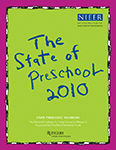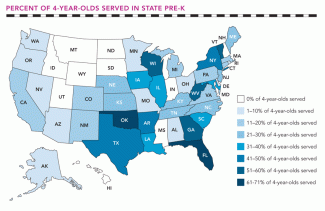
The Bottom Ten
A Closer Look at No-Program States
June 6, 2011

The State of Preschool 2010 provided some good news regarding two new pilot programs in Alaska and Rhode Island, meaning there is no longer a “dirty dozen” of states without preschool education programs. However, 10 states still have not made preschool a priority and lack such programs for young learners. These “Bottom Ten” states do provide some services to their youngest learners through federal special education and Head Start programs, though enrollment is limited only to those most “at-risk,” whether due to disability or meeting a low-income threshold.
“Preschool-age children in these 10 states are denied the opportunity of early learning experiences that will help them succeed both in school and later in life,” says W. Steven Barnett, NIEER’s co-director and author of the report. “In particular, states in the Mountain West and Upper Midwest with predominantly rural populations need to find a way to provide access to high-quality pre-K.”
In this post, we take a closer look at the bottom 10 states that don’t fund pre-K programs meeting our definition of a state program. For additional information on these and all other states, visit the State Data page.
Ten states don't provide state-funded pre-K programs.

Hawaii
Although Hawaii does not have a state-funded pre-K program that meets the criteria of the report, the state funds several initiatives providing early learning services. The state’s Preschool Open Doors Project provides low-income families with subsidies to purchase preschool education for their 4-year-olds and, in limited cases, 3-year-olds with special needs. Income eligibility is reassessed and children can be removed from the program based on increases in family income, so the Preschool Open Doors Project is best viewed as offering support to working families rather than as a dedicated educational program.
Other prekindergarten initiatives in the state include the Pre-Plus Program, Junior Kindergarten, Keiki First Steps, and Special Education Preschool. In addition, the state is piloting pre-K programs in two elementary schools. Although remarkable progress has been made, the “Youngest State” still has room to grow in serving its youngest learners.
Idaho
Idaho dedicated $1.5 million in TANF funds to supplement the federal Head Start program in the 2009-2010 school year, enrolling an additional 195 children in the program. But, even with these children, Idaho enrolls less than 7 percent of the state’s 3-year-olds and less than 15 percent of the state’s 4-year-olds in special education preschool and Head Start. Only Utah enrolls a smaller proportion of 3-year-olds, and Idaho is in the bottom five states for enrollment of 4-year-olds.
Indiana
Enrollment of 4-year-olds in special education preschool and Head Start in Indiana is just barely at 15 percent, with only five states enrolling fewer 4-year-olds. Earlier this year, pre-K was notably absent from Governor Daniels’s education reform agenda. At that time, the office of the state Superintendent of Public Instruction expressed interest in investing in state-funded pre-K but noted that the state funding for such a program was unlikely to be available in the near future.
Mississippi
In 2008, the state established Mississippi Building Blocks, a public-private program designed to provide effective support to and increase the quality of existing child care centers. In 2010, a special commission of business leaders and education experts began studying the program as a basis for establishing a statewide model.
When accounting for early education access through Head Start and special education preschool, Mississippi is in the top 5 states enrolling 3-year-olds, serving a higher percent of 3-year-olds than most states with state-funded pre-K programs. With nearly 27 percent of 3-year-olds served in these federal programs, Mississippi’s enrollment is topped only by Vermont, Illinois, and New Jersey. These four states are the only ones to serve more than a quarter of their 3-year-old population. In addition, Mississippi enrolls almost 37 percent of 4-year-olds in federal pre-K programs. Despite these advances, Mississippi’s lack of state-funded pre-K makes it an anomaly in the South, where nearby states have committed themselves to universal access.
Montana
Federal special education preschool and Head Start programs in Montana enroll nearly 15 percent of 3-year-olds and 22 percent of 4-year-olds in publicly-funded early learning programs. This places Montana in the top 20 states for 3-year-old program access, but the bottom 20 for 4-year-old access. Relying on these programs limits access for most children in the state, and Montana cannot truly be the “Treasure State” for young children until the state makes available access to high-quality pre-K.
New Hampshire
New Hampshire provides slightly more than $300,000 in state supplemental funds to the federal Head Start program. Rather than using these funds to enroll additional children as most states do, New Hampshire dedicates this funding to enhancing teacher salaries. Less than 9 percent of 3-year-olds are enrolled in a state or federal program in New Hampshire, below the national figure of 14 percent. With only about 11 percent of the state’s 4-year-olds enrolled in special education preschool and Head Start, New Hampshire ties with Nevada for the bottom spot for 4-year-old enrollment in state and/or federal pre-K programs.
North Dakota
North Dakota enrolls 16 percent of its 3-year-olds and nearly 24 percent of its 4-year-olds through federal Head Start and special education preschool. But, the Grand Forks Herald notes that Head Start has a waiting list of more than 800 children throughout the state, indicating that demand outpaces access. State Representative Kathy Hawken told the newspaper, “This particular (legislative) session has not been kind to children. We have pretty much defeated most of the bills that had to do with kids, whether it was health care or prenatal care or CHIP (Children’s Health Insurance Program). We didn’t fund school nurses. We didn’t fund Head Start.” In addition, earlier this year, the state Senate defeated a bill to fund a $1.5 million pilot preschool program in four school districts. However, a recent law does include expansion statewide of Gearing Up for Kindergarten, a parent education program designed to prepare 4-year-olds for school. North Dakota has weathered the recession better than most states – since 2006, the state has had the smallest increase in the unemployment rate nationwide, as well as the largest increase in per capita income. Investing in the future workforce through pre-K can solidify the state’s path to economic prosperity and maintain this growth for future generations.
South Dakota
Existing special education preschool and Head Start programs enroll 16.5 percent of the state’s 3-year-olds and 24.5 percent of its 4-year-olds. Additionally, the Starting Strong Sioux Falls public-private pre-K pilot program was in its third year during the 2009-2010 school year. In response to positive outcomes from this pilot program, a pre-K pilot is being planned for Rapid City. While these pilot programs are encouraging, state-funded early education is only available in select areas. Statewide, the “Land of Infinite Variety” consistently shoots down any attempts to vary preschool education opportunities with the inclusion of state-funded pre-K.
Utah
Utah enrolls only 6 percent of its 3-year-olds and almost 13 percent of its 4-year-olds in special education preschool and Head Start. This makes the state last in the nation for enrollment of 3-year-olds. For enrollment of 4-year-olds, Utah exceeds only New Hampshire and Nevada. Unfortunately, Utah is not alone in its underinvestment in young children, as it is one of the four Mountain West states that fail to provide state-funded pre-K.
Wyoming
With no state-funded prekindergarten program, Wyoming still enrolls nearly 17 percent of its 3-year-olds and 26 percent of its 4-year-olds in special education preschool and Head Start. But this means only children with special needs or from low-income families have access to high-quality early learning opportunities. The “Equality State” could benefit from heeding U.S. Secretary of Education Arne Duncan’s comment at The State of Preschool 2010 press conference that educational inequality is the civil rights issue of our time and increased access to quality pre-K and other early learning opportunities is the way to begin addressing disparities.
2009-2010 Enrollment of 3- and 4-Year-Olds in Preschool Special Education & Federal and State Head Start
| State | Percent of 3-year-old population (SpEd) | Percent of 4-year-old population (SpEd) | Percent of 3-year-old population (SpEd + HdSt††) | Percent of 4-year-old population (SpEd + HdSt††) |
| Hawaii | 3.8% | 5.1% | 8.4% | 14.5% |
| Idaho | 3.7% | 5.6% | 6.7% | 14.7% |
| Indiana | 5.2% | 7.0% | 9.7% | 14.8% |
| Mississippi | 4.1% | 6.9% | 26.9% | 36.8% |
| Montana | 2.6% | 5.0% | 14.9% | 22.1% |
| New Hampshire | 5.5% | 7.1% | 8.8% | 11.4% |
| North Dakota | 4.8% | 7.1% | 16.1% | 23.7% |
| South Dakota | 5.3% | 8.0% | 16.5% | 24.5% |
| Utah | 3.9% | 6.1% | 6.5% | 12.8% |
| Wyoming | 10.7% | 16.7% | 16.8% | 26.0% |
†† This figure includes federally funded and state-funded Head Start enrollment.
Source: The State of Preschool 2010: State Preschool Yearbook
Preschool provides a return on investment these states cannot afford to miss out on. Years of research have demonstrated the benefits of high-quality preschool. Compared to children without high-quality preschool, children who attend are more likely to graduate high school and go on to higher education. They are less likely to require special education or repeat a grade, become teenage parents, or commit crimes as teens or adults, all at great savings to taxpayers. As adults, they are more likely to be qualified to fill the demand for skilled workers that will keep America competitive in the global economy. As revenues begin the return to pre-recession levels, each of these ten states in particular must take a good look at their fiscal house and choose to make investment in their future a priority.
– Jen Fitzgerald, Public Information Officer, NIEER
– Megan Carolan, Policy Research Coordinator, NIEER
About NIEER
The National Institute for Early Education Research (NIEER) at the Graduate School of Education, Rutgers University, New Brunswick, NJ, conducts and disseminates independent research and analysis to inform early childhood education policy.
